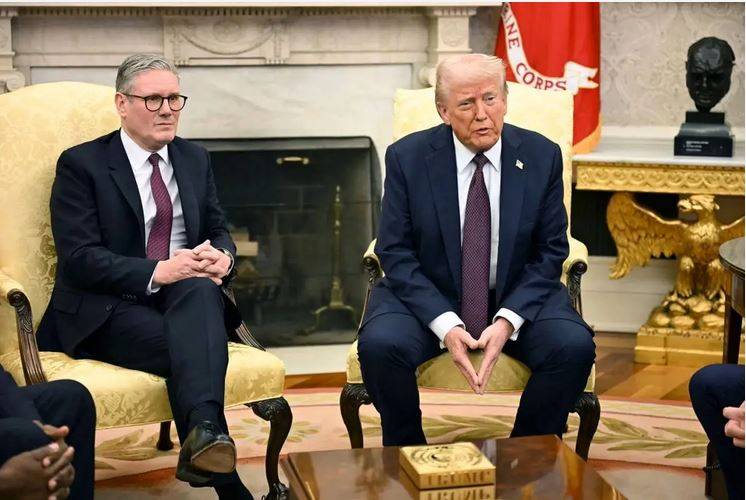835 Views
Trump's Trade Bomb: How 100% Tariffs Threaten to Shatter the "Special Relationship" with Britain
In May 2025, the signing of the U.S.-UK Economic Prosperity Deal (EPD) was considered a milestone in post-Brexit trade relations, promising tariff reductions in key sectors such as automobiles, steel, and aluminum. Praised as a framework for deeper economic relations, its goal was to increase bilateral trade by billions of dollars, creating new export opportunities for American farmers and manufacturers while reducing barriers for British goods.
However, just a few months later, the aggressive tariff threats from U.S. President Trump have plunged this nascent agreement into crisis, exposing existing vulnerabilities and putting pressure on the UK government led by Prime Minister Keir Starmer. Trump's announcements in September 2025, including 100% tariffs on foreign pharmaceuticals and films and 25% tariffs on heavy trucks, have not only disrupted supply chains but also reignited debates about the role of protectionism in global trade. This event signifies a political and economic shock that could weaken the foundations of transatlantic alliances.
For Britain, and particularly for the Starmer government, Trump's stance represents a political and economic shock. The Labour government, hoping to stabilize the economic situation after leaving the European Union, entered the May agreement relying on trade relations with its longstanding ally to compensate for some of Brexit's economic losses. However, Trump's sudden shift in approach and return to aggressive tariff policies have turned this hope into a point of vulnerability. The agreement, intended to create stability, has now become a symbol of the fragility and structural weakness in British trade policy, placing the Starmer government in a difficult position between domestic pressures to maintain economic independence and the need to preserve the alliance with America.
Key UK industries are bearing the brunt of this approach with direct consequences for exports and costs. The pharmaceutical sector, a backbone of the UK economy, faces the threat of a 100% tariff on branded drugs. While giants like GlaxoSmithKline (GSK) and AstraZeneca might be shielded due to extensive investments and production facilities in the U.S., smaller companies lack such privilege. These firms, reliant on exports to the lucrative U.S. market, may experience reduced export volumes and increased operational costs, which could impact innovation and job growth. Similarly, manufacturing sectors targeted by the 25% truck tariffs face comparable challenges. The UK's automotive and transport industries, which constitute a significant portion of exports to the U.S., may confront price increases and reduced demand, disrupting global supply chains.
Widespread concern in the private sector is also evident. According to a British Chambers of Commerce survey, about 60% of exporters expressed concern about the direct impact of this crisis on the U.S. market. Even the UK's National Health Service (NHS) has warned that drug costs could rise, straining public budgets and threatening patient access to medicines. These concerns extend beyond directly affected sectors; integrated supply chains mean disruption in one area can spill over into others, such as financial services and technology, which depend on free trade.
For Keir Starmer's government, this crisis poses a major political challenge. The British Prime Minister faces two difficult choices: either concede to Washington and face domestic criticism, or adopt a tougher stance and risk a trade war with its main ally. The first option might be seen as surrendering to Trump's pressure, undermining domestic support, especially among Labour Party supporters who value fair trade. The second option, while potentially bolstering Starmer's credibility as an independent leader, could lead to economic retaliation that further damages the UK's fragile post-Brexit economy. This dilemma exists within the broader context of diplomatic relations, where Britain seeks to maintain the "special relationship" with the U.S. while grappling with geopolitical realities like the war in Ukraine and competition with China.
But beyond this bilateral struggle, the issue points to a deeper question about the future of Western economic relations. Trump's protectionist policies are not solely economically motivated; they reflect his political attitude that views trade not as a tool for cooperation but as a means of exerting national influence. Targeting allies like Britain is, in fact, a political message to American voters: that Trump places American interests above any international commitment. This approach has revived long-standing European concerns about Washington's instability and unpredictability and will likely accelerate the process of diversifying Europe's economic relations.
In London, some officials at the Treasury and Department for Business are exploring alternative options. Proposals have been made to expand cooperation with the European Union in pharmaceuticals, clean energy, and digital trade. Simultaneously, other policymakers are talking about expanding relations with Commonwealth countries like Canada, Australia, and India to reduce the UK's economic dependence on the U.S. While none of these paths can fully replace trade relations with America, they indicate a gradual shift in London's long-term strategy.
In conclusion, it must be said that Trump's tariff threats have once again placed transatlantic economic relations at a critical point. The agreement that was supposed to bring stability has now itself become a focal point of tension and distrust. For the Starmer government, the main challenge is finding a balance between the demands of domestic politics and geo-economic realities; a task that, if not managed carefully, could have profound consequences. These events show that trade diplomacy in the age of populism and great power competition has become more fragile than ever. Trump's tariffs not only pose a direct threat to the UK's pharmaceutical industry and exports but also reveal fundamental weaknesses in the London-Washington relationship. If the current crisis continues, the likelihood of entering a trade war between two traditional Western allies increases; a crisis that could not only transform the future of the U.S.-UK trade agreement but also call into question the credibility and cohesion of Western economic cooperation on a broader scale.
Translated by Ashraf Hemmati from the original Persian article written by Mohammad Mehdi Esmailkhaniyan
https://subscriber.politicopro.com/article/2025/09/trump-tariff-threats-punch-holes-in-uk-trade-deal-00588118
https://www.reuters.com/business/healthcare-pharmaceuticals/britain-says-pushing-better-outcome-us-pharma-tariffs-2025-09-26/
https://www.nytimes.com/2025/09/26/business/europe-pharma-tariffs-trump.html

Comment
Post a comment for this article